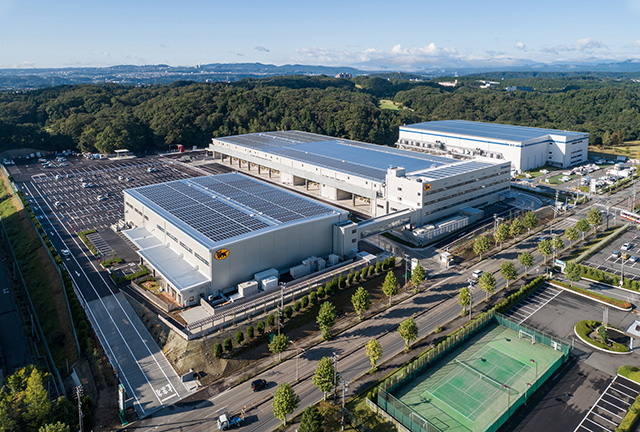
AMB Property Corporation(R)
The report examines the impact of global trade on industrial real estate demand; the long-term relationship between trade and gross domestic product (GDP); insight into the evolution of trade; as well as the major trends that are expected to considerably influence the supply chain and warehousing needs of the future.
"Our analysis indicates that, while the global economy is in the midst of a recession, the fundamental drivers of industrial real estate demand remain intact. The recent declines in global trade volumes and the net absorption of industrial real estate--factors that are more aligned than ever--represent a temporary pause in a strong, longstanding secular trend. Today's interconnected, highly-efficient supply chains are not reversing in any meaningful way, and, on the margin, there are early signs that trade volumes may be stabilizing," said David C. Twist, AMB's vice president, Research.
Summary of Findings
-- Variations in trade account for 80 percent of the historical variation
in industrial real estate demand.
-- Growth in trade volume is highly correlated with GDP (U.S. and global)
and trade growth as a multiple of the GDP growth rate has more than
doubled over the last 50 years. In the past decade, trade's multiplier
on GDP expanded to 3.5, and as a result, nominal changes in GDP growth
result in significant changes in trade growth. Global expectations for
GDP in 2009 imply trade should fall by approximately 10 percent, a
view consistent with that of industry experts.
-- There are four significant factors that have contributed to the recent
declines in trade: inflation fluctuations; financing availability;
supply chain responsiveness; and miscounting of final products.
-- Despite the current economic and financial downturn, structural
support for the trade-to-GDP and trade-to-industrial-real-estate
demand relationship remains intact. The global shift of labor,
productivity and capital over many decades has created complex but
efficient supply chains. A fundamental shift back to domestic
production is not feasible as it would take decades and require much
added cost to implement.
-- Consensus estimates for 2010 GDP growth in the U.S. and globally are
currently at about 2.0 percent. This level of growth is consistent
with about 500 million square feet of industrial real estate demand
globally, and the beginning of a healthy recovery.
A copy of AMB's research report on the long-term prospects for global trade and industrial real estate demand, as well as other reports, can be downloaded from the company's website at www.amb.com/global_capabilities/research.html.
AMB Property Corporation.(R) Local partner to global trade.(TM)
AMB Property Corporation(R) is a leading owner, operator and developer of industrial real estate, focused on major hub and gateway distribution markets in the Americas, Europe and Asia. As of March 31, 2009, AMB owned, or had investments in, on a consolidated basis or through unconsolidated joint ventures, properties and development projects expected to total approximately 159.0 million square feet (14.8 million square meters) in 48 markets within 14 countries. AMB invests in properties located predominantly in the infill submarkets of its targeted markets. The company's portfolio is comprised of High Throughput Distribution(R) facilities--industrial properties built for speed and located near airports, seaports and ground transportation systems.
AMB's press releases are available on the company website at www.amb.com or by contacting the Investor Relations department at +1 415 394 9000.
Some of the information included in this press release contains forward-looking statements, such as those related to our expectations for trade and GDP growth in the U.S. and globally and future industrial demand, which are made pursuant to the safe-harbor provisions of Section 21E of the Securities Exchange Act of 1934, as amended, and Section 27A of the Securities Act of 1933, as amended. Because these forward-looking statements involve risks and uncertainties, there are important factors that could cause our actual results to differ materially from those in the forward-looking statements, and you should not rely on the forward-looking statements as predictions of future events. The events or circumstances reflected in forward-looking statements might not occur. You can identify forward-looking statements by the use of forward-looking terminology such as "believes," "expects," "may," "will," "should," "seeks," "approximately," "intends," "plans," "pro forma," "estimates" or "anticipates" or the negative of these words and phrases or similar words or phrases. You can also identify forward-looking statements by discussions of strategy, plans or intentions. Forward-looking statements are necessarily dependent on assumptions, data or methods that may be incorrect or imprecise and we may not be able to realize them. We caution you not to place undue reliance on forward-looking statements, which reflect our analysis only and speak only as of the date of this report or the dates indicated in the statements. We assume no obligation to update or supplement forward-looking statements. The following factors, among others, could cause actual results and future events to differ materially from those set forth or contemplated in the forward-looking statements: defaults on or non-renewal of leases by tenants, increased interest rates and operating costs, our failure to obtain necessary outside financing, re-financing risks, risks related to our obligations in the event of certain defaults under joint venture and other debt, risks related to debt and equity security financings (including dilution risk), difficulties in identifying properties to acquire and in effecting acquisitions, our failure to successfully integrate acquired properties and operations, our failure to divest properties we have contracted to sell or to timely reinvest proceeds from any divestitures, risks and uncertainties affecting property development and construction (including construction delays, cost overruns, our inability to obtain necessary permits and public opposition to these activities), our failure to qualify and maintain our status as a real estate investment trust, risks related to our tax structuring, failure to maintain our current credit agency ratings, environmental uncertainties, risks related to natural disasters, financial market fluctuations, changes in general economic conditions or in the real estate sector, changes in real estate and zoning laws, a downturn in the U.S., California or global economy, risks related to doing business internationally and global expansion, losses in excess of our insurance coverage, unknown liabilities acquired in connection with acquired properties or otherwise and increases in real property tax rates. Our success also depends upon economic trends generally, including interest rates, income tax laws, governmental regulation, legislation, population changes and certain other matters discussed under the heading "Risk Factors" and elsewhere in our annual report on Form 10-K for the year ended December 31, 2008.
First Call Analyst: Robinson, Victoria
FCMN Contact: [email protected]
SOURCE: AMB Property Corporation
CONTACT: Tracy A. Ward, Vice President, IR & Corporate Communications,
+1-415-733-9565,
Public Relations, +1-415-733-9532,
Corporation
Web Site: http://www.amb.com/


